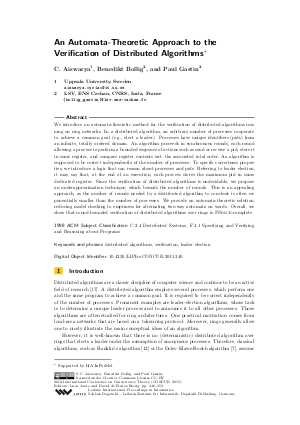An Automata-Theoretic Approach to the Verification of Distributed Algorithms
Authors Cyriac Aiswarya, Benedikt Bollig, Paul Gastin
-
Part of:
Volume:
26th International Conference on Concurrency Theory (CONCUR 2015)
Part of: Series: Leibniz International Proceedings in Informatics (LIPIcs)
Part of: Conference: International Conference on Concurrency Theory (CONCUR) - License:
 Creative Commons Attribution 3.0 Unported license
Creative Commons Attribution 3.0 Unported license
- Publication Date: 2015-08-26
File

PDF
LIPIcs.CONCUR.2015.340.pdf
- Filesize: 1.43 MB
- 14 pages
Document Identifiers
Subject Classification
Keywords
- distributed algorithms
- verification
- leader election
Metrics
- Access Statistics
-
Total Accesses (updated on a weekly basis)
0Document
0Metadata
Abstract
We introduce an automata-theoretic method for the verification of distributed algorithms running on ring networks. In a distributed algorithm, an arbitrary number of processes cooperate to achieve a common goal (e.g., elect a leader). Processes have unique identifiers (pids) from an infinite, totally ordered domain. An algorithm proceeds in synchronous rounds, each round allowing a process to perform a bounded sequence of actions such as send or receive a pid, store it in some register, and compare register contents wrt. the associated total order. An algorithm is supposed to be correct independently of the number of processes. To specify correctness properties, we introduce a logic that can reason about processes and pids. Referring to leader election, it may say that, at the end of an execution, each process stores the maximum pid in some dedicated register. Since the verification of distributed algorithms is undecidable, we propose an underapproximation technique, which bounds the number of rounds. This is an appealing approach, as the number of rounds needed by a distributed algorithm to conclude is often exponentially smaller than the number of processes. We provide an automata-theoretic solution, reducing model checking to emptiness for alternating two-way automata on words. Overall, we show that round-bounded verification of distributed algorithms over rings is PSPACE-complete.
Cite As Get BibTex
Cyriac Aiswarya, Benedikt Bollig, and Paul Gastin. An Automata-Theoretic Approach to the Verification of Distributed Algorithms. In 26th International Conference on Concurrency Theory (CONCUR 2015). Leibniz International Proceedings in Informatics (LIPIcs), Volume 42, pp. 340-353, Schloss Dagstuhl – Leibniz-Zentrum für Informatik (2015)
https://doi.org/10.4230/LIPIcs.CONCUR.2015.340
BibTex
@InProceedings{aiswarya_et_al:LIPIcs.CONCUR.2015.340,
author = {Aiswarya, Cyriac and Bollig, Benedikt and Gastin, Paul},
title = {{An Automata-Theoretic Approach to the Verification of Distributed Algorithms}},
booktitle = {26th International Conference on Concurrency Theory (CONCUR 2015)},
pages = {340--353},
series = {Leibniz International Proceedings in Informatics (LIPIcs)},
ISBN = {978-3-939897-91-0},
ISSN = {1868-8969},
year = {2015},
volume = {42},
editor = {Aceto, Luca and de Frutos Escrig, David},
publisher = {Schloss Dagstuhl -- Leibniz-Zentrum f{\"u}r Informatik},
address = {Dagstuhl, Germany},
URL = {https://drops.dagstuhl.de/entities/document/10.4230/LIPIcs.CONCUR.2015.340},
URN = {urn:nbn:de:0030-drops-53737},
doi = {10.4230/LIPIcs.CONCUR.2015.340},
annote = {Keywords: distributed algorithms, verification, leader election}
}
